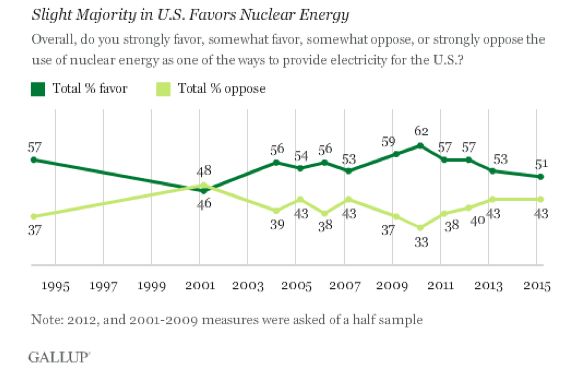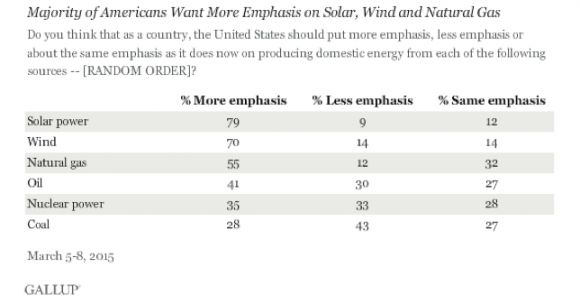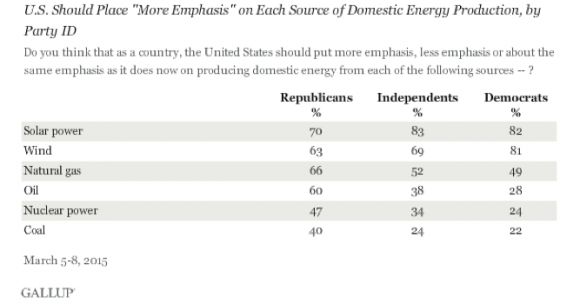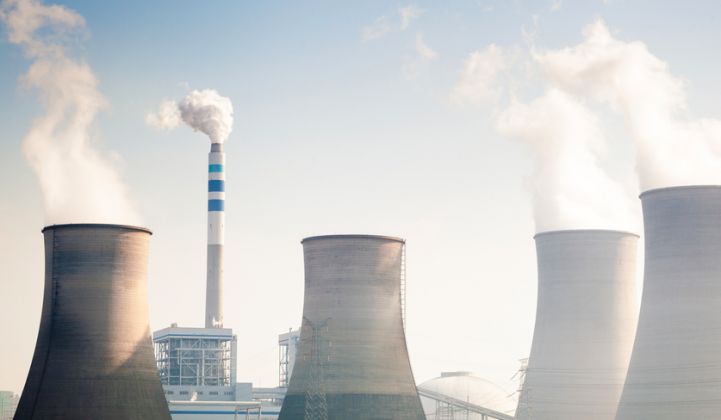Nuclear energy is losing popularity. A recent Gallup poll found that a slim majority of Americans -- 51 percent -- say they favor nuclear energy for electricity generation in the United States, while 43 percent say they oppose it. This year's support levels are among the weakest Gallup has recorded in the last two decades. With a 46 percent approval rating, 2001 was the only year support sank lower.
Public approval of nuclear energy peaked in 2010 at 62 percent, shortly after President Barack Obama announced $8 billion in federal loan guarantees for the construction of two nuclear reactors in Georgia. The new, roughly 1,200 megawatt nuclear reactors at the Alvin W. Vogtle Electric Generating Plant, are the first to be built in the U.S. in three decades.
Over the last five years, support for nuclear energy has fallen by more than 10 percentage points.

Nuclear energy started to fall out of favor in 2011, following the Fukushima nuclear disaster in Japan. More than half of Americans -- 53 percent -- said they would support “a moratorium on new nuclear reactor construction in the United States” if “increased energy efficiency and off-the-shelf renewable technologies such as wind and solar could meet our energy demands for the near term," according to a survey conducted by ORC International for the nonprofit and nonpartisan Civil Society Institute (CSI) shortly after the Fukushima reactor crisis.
The new Gallup poll similarly found a preference for renewable energy alternatives to nuclear power. The vast majority of respondents -- 79 percent -- called for a greater emphasis on solar power. Wind was close behind at 70 percent.
Thirty-five percent of Americans think the U.S. should put more emphasis on nuclear power, while 33 percent favor less emphasis and 28 percent say the emphasis should remain unchanged. Only coal had less support, with 43 percent of respondents saying coal should have less emphasis as a domestic energy resource.

Support for each energy source varied somewhat based on political affiliation. Republicans showed the most support for nuclear energy, with 47 percent of respondents calling for more nuclear in the U.S. energy mix, versus 24 percent of Democrats. Members of the two parties differed even more on the use of oil.

While the country has become increasingly divided on nuclear energy, often along party lines, the Obama administration has continued to support the technology.
Last December, the Department of Energy issued a $12.5 billion loan guarantee solicitation for advanced nuclear energy projects. A carve-out of $2 billion will fund innovation in uranium conversion, uranium enrichment or nuclear fuel fabrication. The rest of the money will go to nuclear power facilities, including state-of-the-art design reactors, modular reactors that are 300 megawatts or smaller, and upgrades that would extend the life of existing facilities.
The International Energy Agency argues that in order to keep global temperatures from rising beyond 2 degrees Celsius (a globally recognized tipping point), the nuclear industry will need to bring 12 gigawatts of capacity on-line every year for the next decade. The trend, however, has been in the opposite direction. Global nuclear energy generation has fallen 10 percent since 2010; new investments have declined, too. Meanwhile, the Vogtle plant is facing repeated delays and an additional $720 million in charges.
With increased availability of low-cost natural gas and renewable energy, it's likely that support for nuclear energy could continue to drop in the coming years.
The Gallup poll is based on a survey of 1,025 adults living in the U.S., and was conducted from March 5-8, 2015.



